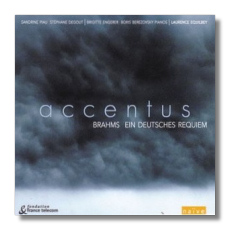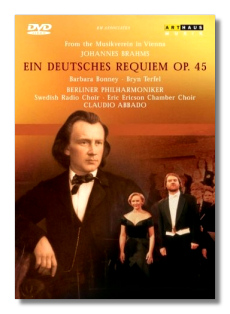
The Internet's Premier Classical Music Source
Related Links
- Brahms Reviews
- Latest Reviews
- More Reviews
-
By Composer
-
Collections
DVD & Blu-ray
Books
Concert Reviews
Articles/Interviews
Software
Audio
Search Amazon
Recommended Links
Site News
 DVD Review
DVD Review
Johannes Brahms

Ein Deutsches Requiem, Op. 45
London version
Sandrine Piau, soprano
Stéphane Degout, baritone
Brigette Engerer, piano
Boris Berezovsky, piano
Accentus/Laurence Equilbey
Naïve V4956 DDD 64:54


From the Musikverein in Vienna
Barbara Bonney, soprano
Bryn Terfel, baritone
Swedish Radio Choir
Eric Ericson Chamber Choir/Maria Weislander
Berlin Philharmonic Orchestra/Claudio Abbado
Arthaus Musik DVD 101047 79min 16:9 Widescreen LPCM Stereo
In the 1800s it was not uncommon for orchestral works to be arranged for piano, thereby making home performance possible, after a fashion. Brahms completed his German Requiem in 1868, and he prepared a reduction of the work (including the vocal parts) almost immediately for piano four hands. Four years later, the work was premièred in London, not in the concert hall, but in the home of Sir Thomas Thompson, a prominent surgeon and writer. This première did not involve an orchestra, of course, but it did include a chorus of thirty, two soloists, and, on a single piano, the hostess and one Cipriani Potter.
This Accentus recording attempts to recreate that intimate première, with two exceptions. First, "for reasons of sonority" two separate pianos are used, and the portions of the piano score that double vocal lines have been omitted, as they are "superfluous." Accentus also is forty-strong, and might well have strained Lady Thompson's performance space, such as it was.
Normally, when performed by an orchestra and a full-sized chorus, this requiem is pretty imposing stuff, even if Brahms was careful to ensure that it remained both human and humane. This scaled-down version is not without interest, particularly to admirers of the work. Implacability is softened and sternness is made gentle. Brahms didn't intend to make those who heard the original work tremble in fear for their souls, although it is impossible not to feel twinges of guilt and awe when assailed by a massive choir and orchestra. Heard as it is here, this is a kinder work, and familiar timbres give solace. Indeed, in terms of personnel, this is a German Requiem that could segue into the Liebeslieder Waltzes without too much difficulty.
Equilbey and Accentus have made several striking choral CDs, and this one is no exception. Even with its small size, the alertness and precision of Accentus creates the impression of a larger group. Piau and Degout are attractive (but not very personal), and pianists Engerer and Berezovsky do what they can to make two pianos sound like 100 instruments of the orchestra. The engineering needs more air. This release is packaged attractively, with full booklet notes (including texts and translations) and Digipak packaging.
For those who want a cherries-and-all Brahms experience, there's a DVD of a concert recorded in the Vienna Musikverein in 1997. (The precise date is not given, and the DVD box tells us that this is a "memorial concert," although we are not told who or what is being memorialized.) This is the German Requiem in all its sorrow and joy, something that can be appreciated only when a full-sized chorus and orchestra are on hand.
Abbado's conducting is slow and stately, but he is not deaf to those moments when the sun bursts through the clouds. For all its seriousness, this is not a work lacking in melting moments and compassion. The Swedish choirs do a superb job. Bonney is appropriately radiant in "Ihr habt nun Traurigkeit," and Terfel is personable and communicative in his solo work as well.
The sound engineers have captured the atmosphere of the Musikverein, yet have blocked out unwanted noise. (Note the audience member apparently coughing her lungs out at the start of the work.) The camerawork is passable. There are too many gratuitous close-ups, and the director seems to have a fascination with the pillars at the rear of the hall. Two charming details caught my eye. At the end of the performance, a member of the orchestra appears to congratulate Bonney, who responds graciously. Also, when Abbado goes offstage to let the singers take their bows, someone seems to be slapping him in the wings! It must have done him good, because he returns to the stage with a big smile on his face.
Subtitling is available for those who wish it.
Copyright © 2004, Raymond Tuttle




















